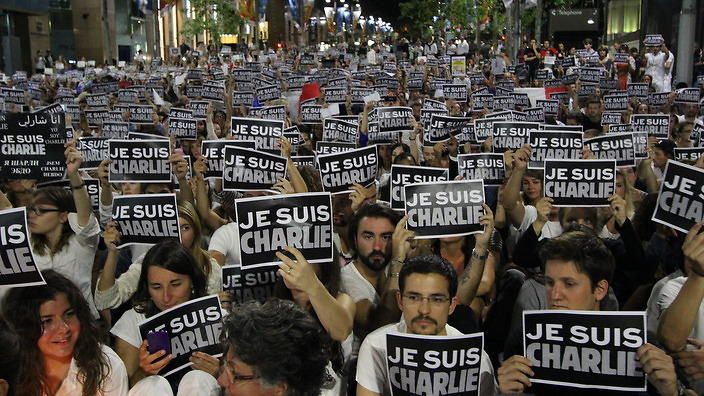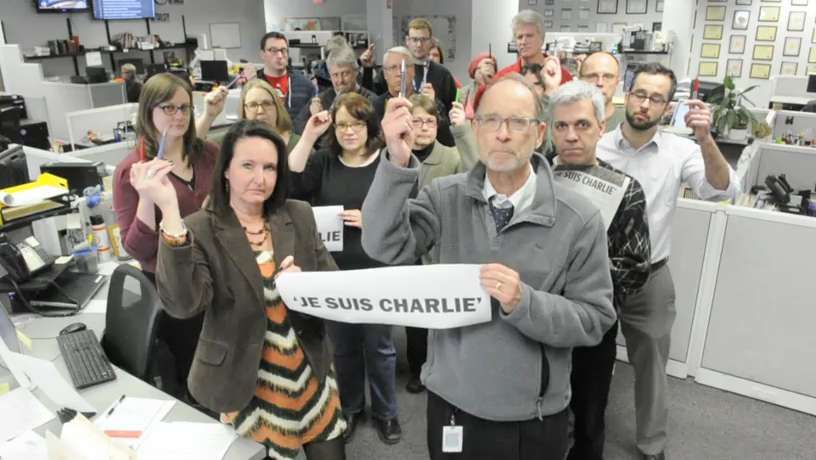No doubt about it: seeing photos of large crowds with their "Je suis Charlie" signs brought emotions I never thought I'd feel again, especially hope for resistance to Islamization of the West. Whatever else you might say about these demos, they were for once active, not defensive and half-apologetic. Many people of all kinds were not prepared to understand or forgive cold-blooded murder on behalf of a vicious ideology hitched to a religion.
For the moment at least, the pleas of the can't-we-all-get-along weenies were drowned out.
Gates of Vienna published an account of an interview with English journalist Douglas Murray. What Murray said wasn't bad, but Gates of Vienna publisher Baron Bodissey went further:
In the aftermath of the Charlie Hebdo massacre, Mr. Murray was discussing the sham nature of all the candle-lit vigils for “free speech” that were then taking place. Well-meaning, well-heeled people stood with pens held high and tears running down their cheeks, holding signs that read “Je suis Charlie”. But in all likelihood none of them — especially those associated with Big Media — will do what Charlie Hebdo did: lampoon Islam with unbridled ferocity. ...These heartfelt demonstrations are no more than beautiful lies. This is all theater — public posturing that makes ordinary middle-class people feel good about themselves. Full of sound and tear-drenched sentiment, but signifying nothing.
I'm glad Bodissy wrote this, and it may be a fair point. But while I normally lead the parade of Cynics United, twirling my baton, it remains to be seen if most of the demonstrators are quite the moral exhibitionists he thinks. Of course it takes no courage to hold up a sign or a pencil in the midst of thousands of other protesters; it's about as risky as putting a "Coexist" bumper sticker on your car in Berkeley.
Yet ... while individuals can sometimes convert seemingly in a flash because of views that have been slowly building unconsciously (William James has a striking chapter about the phenomenon in The Varieties of Religious Experience), societies don't work that way. Big turnarounds are accretive, tentative at first, then gathering strength and speed. People who wouldn't dare take an uncompromising stand against quasi-religious totalitarianism look around, see a huge gathering of people speaking out, and realize they have allies. It's not the end of the road toward reclaiming freedom of speech and thought, but it's an important step.
Can the leopard change his spots? Can the New York Times change its template for every article about ethnic and religious divisions? I'm more certain of the answer to the second question. Here's the usual fill-in-the-blanks "backlash" story from the Times:
PARIS — Last week’s terrorist attacks without doubt set all of France on edge, but the sense of wariness, even siege, has grown increasingly profound among France’s Muslim population — the largest in Europe — which seems braced for a potential backlash, both political and personal.
Since the attack Wednesday on the offices of the satirical newspaper Charlie Hebdo, several mosques across France have been hit by bullets or small explosive devices. Many more have been tagged by racist graffiti. In Corsica, a severed pig’s head was hung on the door of a prayer hall, the police reported.Those actions followed weekly marches by tens of thousands in Germany, demonstrating against what they call the Islamization of Europe, the firebombing of a mosque in Sweden and warnings by British officials about a rise in Islamophobia.
"Bullets or small explosive devices ... racist graffiti ... pig's head ... ." These things may be bad form, but you have to expect a few hotheads are going to get carried away after something like the Charlie Hebdo massacre.
What else does this backlash involve? Peaceful marches in some German cities. The firebombing of a mosque (three, actually: inexcusable but not exactly Kristallnacht). Warnings by British officials, who are indoctrinated down to their toenails to cater to the Muslim population, about a rise in "Islamophobia." Some backlash.
Amid the rising suspicions and animus, and louder calls from the French right for stricter measures against Muslim radicals and immigration in the wake of the attacks, a broader question is emerging as to how France can close the breach. For the time being, the answer may be a retreat to the corners by the mainstream Muslim community, even as prominent voices urge moderation from extremist imams and disenfranchised Muslim youth.
Okay, you extremist imams and youth. Cool it for now while we look for a way to outlaw the National Front and keep Marine Le Pen from speaking in public.




2 comments:
Sorry Rick, I disagree.
As I mentioned elsewhere, it isn't that simple.
Here in ''the first world'' it's easy to say ''I support the 1st amendment'', but that is a ''first world'' POV.
What happened in Paris was the ''third world'' saying ''screw your 'first world' values'' WE will make the rules that YOU will have to live under!!!
And what does ''the first world'' do about it?
A worthless ''march against violence''.
BTW, how are the cats adjusting? Cats are pretty good at getting used to a new territory.
Once they get ''the lay of the land''... ;)
YIH,
I don't say the Paris demos are a turning point or like storming the Bastille (which, by the way, was a farce).
But they could help implant backbones in quite a few participants who have felt constrained to keep their thoughts to themselves. If they need a million fellow demonstrators to be comfortable acknowledging the disaster that Islamization has brought to France, that's still progress.
Both cats have completely adjusted to the new house. I think Matisse in particular likes to have more territory to explore.
Post a Comment